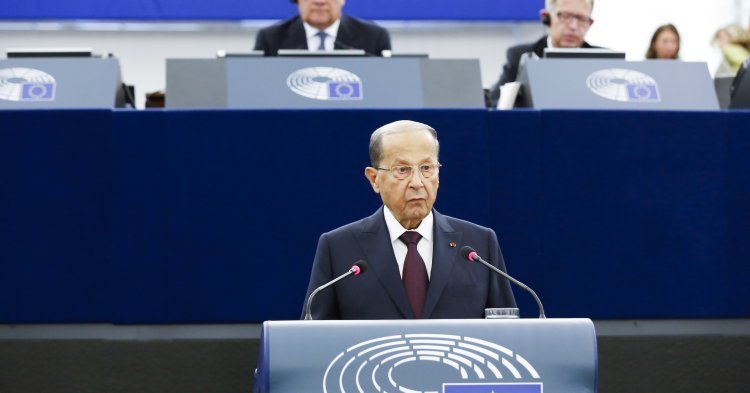The Syrian refugee crisis – an “unsustainable burden” on Lebanon
Compared to the international community and in relation to its own population size, Lebanon has accepted the most refugees since the start of the Syrian civil war in 2011. Lebanon, a small country bordering Syria in the North and the East as well as Israel in the South, has no more than 6.2 million inhabitants. The admission of over one million refugees in addition to the many Palestinian refugees, who have already been living in the country for a long time, is in consequence an incomparable challenge for Lebanon.
Although the Lebanese government has tightened its immigration policy since 2015 – especially by stopping the reception of Syrian refugees through the relevant authorities – the number of Syrian refugees registered in the country has only diminished slightly from 1.017 million in 2016 to 1.001 million in 2017. These numbers are taken from a 2017 joint report of UNICEF and UNHCR. Consequently and from the very beginning of his speech, the Lebanese president reminded his audience of the difficult situation that his country finds itself in, caused, first and foremost, by the Syrian civil war. “Migration, especially Syrian, is one of the biggest consequences of the wars around us and affects our society, our economy and our security. It was humane solidarity that caused Lebanon to accept more than one million Syrians fleeing the hell of civil war in their country.”
Michel Aoun subsequently emphasised the failure of international solidarity with respect to the huge migration movements of recent years. The international community – prominent therein the EU – has been neglecting the “principle of sharing the burden between states.” In doing so, the members have missed the chance to moderate the effects of migration on Lebanon. In this context, Aoun called on the EU to actually pay financial aids promised at a conference in Brussels in April 2018. At this conference, attended by 57 countries, ten regional organisations, and 19 UN agencies, it was decided to provide financial aid amounting to 4.4 billion dollars for 2018. This aid is intended for Syrians in Syria or neighbouring countries.
Aoun also drew attention to some issues in the conference’s final communiqué. He especially criticised the fact that the return of refugees is only intended on a voluntary basis, and upon achieving a political solution to the conflict. He also criticised the intended integration of refugees in local job markets. “I will remind you that Lebanon is a country of emigration and not one to which people come to settle. This is even more true for the labour market. Take, as proof, the many Lebanese living in Europe and spread across the entire world.” The Lebanese diaspora, a consequence of the many crises the country has experienced, is indeed one of the greatest and oldest in the world. Bringing the topic of the refugee crisis to a close, Aoun stressed that the main goal of his policy stance was the safe and humane return of Syrians to Syria. He rejected any form of delay in this matter. “My country supports all approaches attempting to end the displacement of Syrians onto our territory, such as the Russian initiative. We refuse to tie the return of the displaced to some, possibly very distant, political solution.”
The question of Palestine
Since its formation, Lebanon has suffered political crises time and again, as well as a bloody civil war followed by multiple short-term conflicts. The issue with the greatest impact on the country must, without doubt, be the conflict between Israel and the Arab states. The question of Palestine remains central to Lebanese politics. The Lebanese president emphasised that “international policy further promotes radicalisation and opens the door for violence and terrorism.” Subsequently, Aoun said that this policy caused Israel to “make” Jerusalem Jewish and to render the city its capital contrary to “all resolutions of the General Assembly of the UN and the UN security council.”
The USA confirmed at the end of August 2018 that they would cease to support the United Nations Relief and Works Agency for Palestine Refugees in the Near East (UNRWA). This agency, formed in 1949 after the outbreak of the first Israeli-Arab war, provides vital support to Palestinians living in the West Bank and Gaza, but also in Jordan, Lebanon and Syria. Today, a total of 5.2 million Palestinians are registered as refugees through UNRWA.
In Aoun’s view, the US decision marks the beginning of a de facto permanent settling of Palestinians in the host countries, including Lebanon whose constitution does not allow the settlement of people without Lebanese heritage. His country rejected the current situation “in the name of justice and equality of all people,” said Aoun.
The economic situation remains tense
It is not surprising that Aoun also drew attention to economic questions. The EU is Lebanon’s most important trade partner. One third of Lebanese foreign trade is conducted with European countries. Since 2006, the relations between Lebanon and the EU have been regulated by an association agreement. Michel Aoun reminded the audience that the country was suffering heavily – economically, socially and security-wise – due to the crises in neighbouring states. He pointed out that Lebanon was facing a number of challenges, especially in the economic field. His government was endeavouring to stimulate the country’s economy by increasing activity in the productive sectors and modernising infrastructure. In doing so, the country was abiding by the goals of the so-called CEDRE conference, held on 6 April in Paris and aiming to support Lebanon.
In the course of this conference, Lebanon was promised 11 billion dollars in donations and loans. 50 states and international organisations had convened in order to help the country finance its perennial development project. According to Aoun, the project will be accompanied by measures against corruption and for increased transparency. The primary responsibility for the programme’s implementation, however, is to be in the hands of the next government. The political situation, though unstable, was no matter for concern. The formation of a government has been difficult since the Lebanese parliamentary elections in May 2018, in which the radical Shia Hezbollah narrowly won. The parties which were able to record gains in the election come from completely opposed areas of the political spectrum. So far, no deal has been reached.
However, Aoun emphasised that, in these times of political division in Lebanon, the unity of the country was by no means threatened. Extremist views existed but they weren’t spreading. Lebanese society was not vulnerable to extremism. Rather, freedom of religion, opinion and press were integral parts of Lebanese culture. These qualities helped Lebanon overcome problems and could serve as an example for other countries. In the near future, Aoun is planning to provide the United Nations with a plan to make Lebanon a permanent centre for international and inter-religious dialogue – hoping for the EU’s support in this matter.


Follow the comments: |
|
